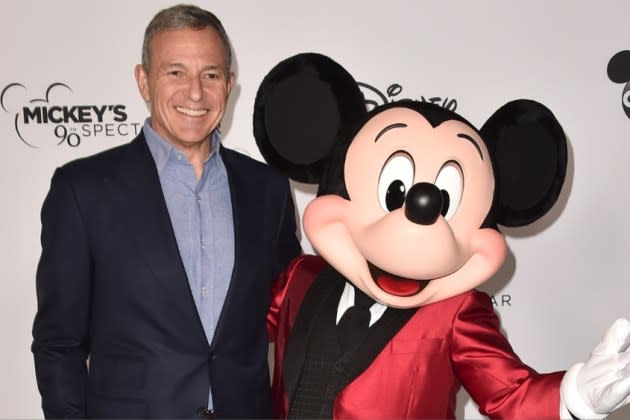Mickey’s Boardroom Adventure: What’s the End Game for Disney’s Activist Investor Foes?

UPDATED: For nearly 40 years, the Walt Disney Co. has largely been seen as an invincible force in the business of entertainment.
Sure, the Mouse House has had its good and not-so-good years at the box office and in TV viewership rankings. But with one major exception, in 2004, the company’s status as a high-performing pillar among the world’s largest media companies has rarely been questioned. That changed last year when activist investor Nelson Peltz, chairman of Trian Fund Management, decided to take aim at Disney.
More from Variety
Disney+ Will Begin Cracking Down on Users Suspected of 'Improper' Password Sharing This Summer
Disney+ Drops 1.3 Million Subscribers Amid Price Hike, Streaming Loss Shrinks by $300 Million
Trian and rival firm Blackwells Capital have launched dueling PR campaigns and proxy fights to prod Disney to make changes to its corporate governance and long-term strategy. Both efforts are highly unlikely to achieve their stated goals of forcing new board members on Disney through the shareholders vote at the company’s April 3 annual meeting. But they have already succeeded in damaging the aura of Disney as a company that is untouchable by outsiders because of its masterful ability to flex corporate power and creative muscle. Disney’s harshest critics will be quick to pounce on any bad news reported Feb. 7 when the company unveils earnings for the fourth quarter of 2023.
RELATED CONTENT: Disney, Fox and Warner Bros. Discovery Team for Streaming Sports Joint Venture
Peltz’s on-again, off-again campaign to shake up Disney’s board of directors, which started in January 2023, unleashed a flood of Wall Street analysis of the company’s performance and its prospects. It also sparked a rival effort from Blackwells Capital, a low-profile New York-based investment firm. Peltz wants to appoint himself and Jay Rasulo, Disney’s former parks chief and chief financial officer, to Disney’s 13-member board. Blackwells is backing three candidates with media and investment backgrounds: Jessica Schell, Craig Hatkoff and Leah Solivan.
The path for Trian or Blackwells to secure enough shareholder votes at the April 3 meeting to unseat incumbent board members is slim to none. Disney has 1.8 billion shares outstanding as of Feb. 5.
Moreover, even with a two-year stock slump, there seems to be very little danger of a broad shareholder revolt against CEO Bob Iger. He’s too closely associated with the cloak of invincibility. Besides, the last attempt at a CEO transition lasted 33 months, with the Bob Chapek-Bob Iger tango that resulted in Iger returning to his perch in November 2022.
So what is the real endgame for the activists? Moving the stock price is a legitimate quest, and that has already happened. Shares have climbed 7% since the start of the year, when Peltz stepped up his efforts and Blackwells joined in.
Forty years ago, a much smaller Disney was in danger of being sold off for parts by corporate raiders, until savvy investors recruited then-Paramount executive Michael Eisner to lead a storied turnaround. Twenty years ago, Comcast saw a moment of vulnerability as Eisner’s reign came to an end. Comcast’s unsolicited offer for Disney went nowhere, but it still hastened the CEO handoff from Eisner to Iger.
In 1984 and 2004, Disney fought off outside threats in part via management changes. The road ahead this time is less clear. But unless there’s a major negative bombshell in the latest earnings report, Disney’s aura of invincibility, while dented now, may only come back stronger. For all the noise they’ve made, Disney’s detractors are about to lose most of their ammunition after shareholders vote on April 3.
Iger’s confidence in the company’s ability to power through the activists’ campaign was evident after the company unveiled its fiscal first quarter earnings. Iger told CNBC that he hasn’t spoken to Peltz in “a while” and has “no plans to do so” prior to the April 3 annual meeting. His focus has been on energizing the company to improve profitability and to make its direct-to-consumer streaming ventures the growth engines of the future.
Disney’s management team “is acting with a sense of urgency,” Iger said. “If you look at the results that we just announced, and all the things that we’re talking about, that is the result of a team that is motivated that is focused and now all of us are very optimistic. The last thing that we need right now is to be distracted in terms of our time, our energy by an activist or activists that, frankly, have a completely different agenda, and don’t understand our company, its assets and even the essence of the Disney brand.”
(Pictured: Disney CEO Bob Iger)
Best of Variety
Sign up for Variety’s Newsletter. For the latest news, follow us on Facebook, Twitter, and Instagram.

